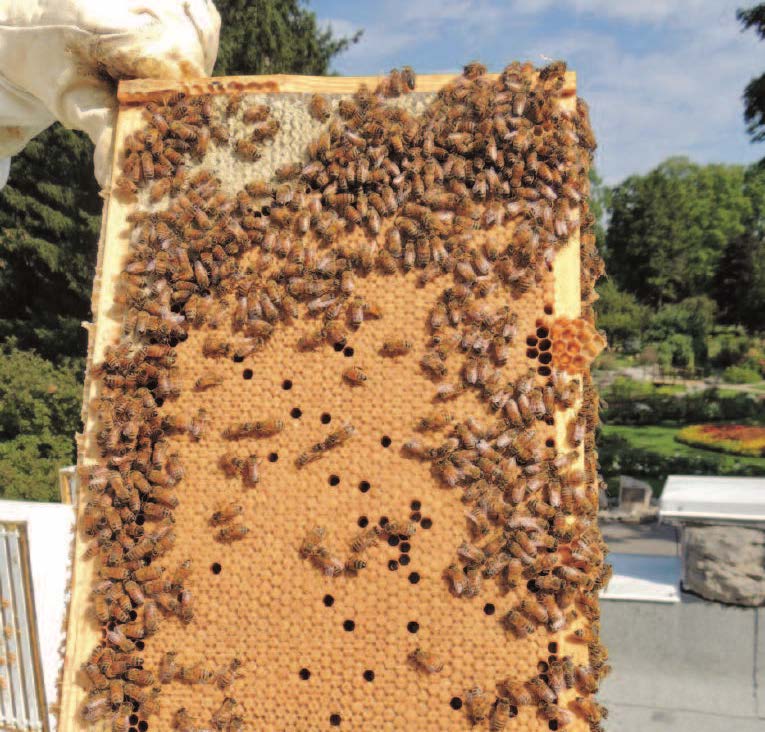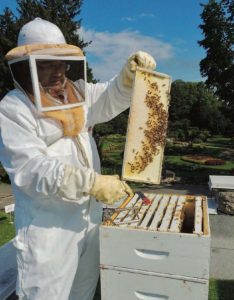
PHOTO: JULIANNE LABRECHE
An urban beekeeping project
By Julianne Labreche | June 2019
When I first met Ben Bazinet, the gardens at Beechwood Cemetery were in full glory with summer blooms. He was selling honey on that sunny day, just as I was about to enjoy a contemplative live Sunday-morning chamber music concert. With his bee suit and a small colony of live honey bees on display beside him, he was easy to spot. That was the start of learning about bees at Beechwood.
A friendly, knowledgeable man, Bazinet tends Italian honey bees as part of a low-key project called the Biotic Pollination Programme that has been operating successfully at the cemetery for a couple of years. He is also a funeral director there, his full-time job. Beekeeping is his hobby. He has a wealth of wisdom to share with anyone interested in urban beekeeping.
Beekeeping is becoming more popular in Ottawa for many reasons. Like other cities in the province, Ottawa has a pesticide ban to protect the public from spraying dangerous chemicals and to help our pollinators. That means that native and non-native bee species are able to forage safely for the nectar and pollen sources they require for sustenance.
Bees also help to pollinate many of our foods and flowers. With the increasing concern over threats to bees — loss of habitat, pesticide use, diseases and climate change — bees need all the help they can get these days, both within our city limits and in the surrounding countryside.
When we met that day at Beechwood, I had just finished publishing a column advocating that Ottawa consider officially becoming a ‘Bee City’, joining approximately nineteen other Canadian cities that have taken a pledge to support biodiversity within their urban environment and help our pollinators. As a gardener, I’ve worked hard to create a pollinator friendly front and back yard to support local wildlife, including bees. Having read the column, Bazinet invited me to spend a morning with him and his bees at Beechwood.
In many ways, he is the ideal person to start a pollinator programme at Beechwood. First, he knows a lot about bees, having raised them since he was a boy. It was his uncle who first taught him about how to care for bees. Later, as a teenager, a high school biology teacher further inspired him, encouraging Bazinet to keep a hive in her apple orchard. At Beechwood, he was able to put a careful plan in place to ensure that his pilot project would be both beneficial for bees and safe for the public.
“This has been a project that has been tremendously well received,” says the apiarist. The bees at the cemetery have successfully survived two winters there. “People don’t see the hives because they’re on the rooftop. We want to help the bees. What better place to have them.” He’s right. There are over 160 acres of pristine landscaping, including over thirty species of trees and shrubs, over 22,000 annual flower seedlings and vast numbers of native wild flowers, grasses and perennials.

PHOTO: JULIANNE LABRECHE
The next week, I returned to the cemetery, this time arranging to meet Bazinet inside. Together, we headed up a few steep sets of stairs, through a few administrative offices and onto the rooftop deck. Before visiting the bees, the beekeeper instructed that I cover myself carefully from head to toe in a white bee suit, don thick gloves and put on a large hat with protective netting. He then fired up the smoker, used to calm the bees so they don’t become agitated as he works around them.
As he prepared to inspect the hives, he explained that any public risk for anyone allergic to bee stings is minimal. His ‘ladies’, as he calls them, forage during the day and are spread out over several kilometres in the surrounding gardens. He also notes that honey bees are not aggressive unless provoked. They’re too busy working, bringing pollen and nectar to the hive.
He says that the honey bees co-exist on the grounds with the other pollinators, including many of our native, solitary bees that don’t sting, don’t produce honey and don’t live in hives. For that reason, he limits his hives to just four to ensure the native bees are not crowded out.
“It prevents saturation,” he says. “We want the native bees to have their place too.”
As he inspects the hives, he is careful, moving slowly. He doesn’t want to agitate the bees or harm them, including the Queen that is invaluable to the hive. He also inspects the hives for any signs of disease, invading insects such as wasps, and other threats. He keeps a watchful eye out for the dreaded varroa mite, common in most hives, which can easily wipe out a colony. That’s why at least one chemical treatment per season is needed, he explains, as a preventative measure.
As I snap photographs — not so easy wearing thick gloves — he continues to move slowly among the bees, occasionally using his smoker if he senses any bees are getting restless. He seems in no hurry. Beekeeping is a calming, relaxing hobby, even though specialized skills are needed and high standards of hygiene in hives need to be maintained.
He explains that even with all the flowering plants at the cemetery, when it comes time to prepare for the cooler weather, he will put out an ample supply of sugar water to give the insects the nutrients they require to make it through another long, cold Ottawa winter.
About 200 pounds of honey are bottled each year at Beechwood. It is either given away to visiting dignitaries and clergy and other visitors or sold to support the pollination project.
“It’s been a wonderful little project,” says the beekeeper. “It’s very low key. Bees are important. Remember, bees pollinate about one-third of our food chain.”
Just before re-entering the building, we inspect our bee suits to ensure that no stray bees enter the building. My morning with the bees at Beechwood has ended. Even though I will probably never be a beekeeper myself, the visit has given me a better appreciation as a gardener for the relationship between bees and plants in urban Ottawa, as well as the important role that bees play in nature and in our own survival. Plus, I’ll get to enjoy two jars of liquid honey.
Beekeeping 101
If you think you’d like to become an urban beekeeper, consider these suggestions: Check out licensing requirements through the Ontario Ministry of Agriculture, Food & Rural Affairs (OMAFRA), including allowable space size on your property for a hive. Sign up for a course, read and learn as much as possible about bee hygiene, care and diseases. Join the Ottawa Community Beekeepers, assisting beekeepers in the local community (ottawabees.org). Offer to participate in research addressing bee health stressors. If keeping a hive turns out to be unrealistic, consider creating a pollinator garden instead.
Julianne Labreche is a member of Master Gardeners of Ottawa-Carleton. Her own garden is wildlife and pollinator friendly.






